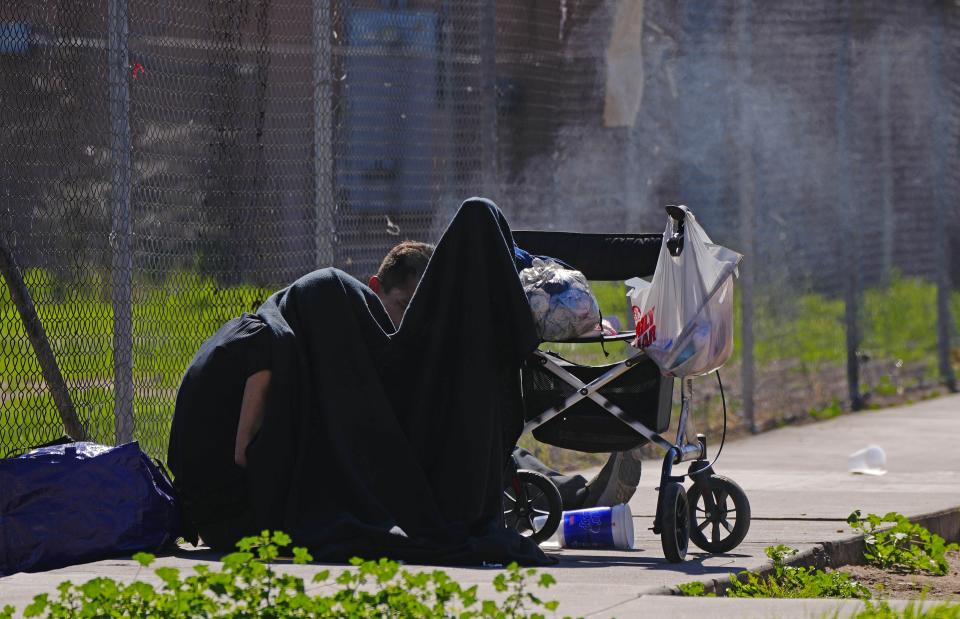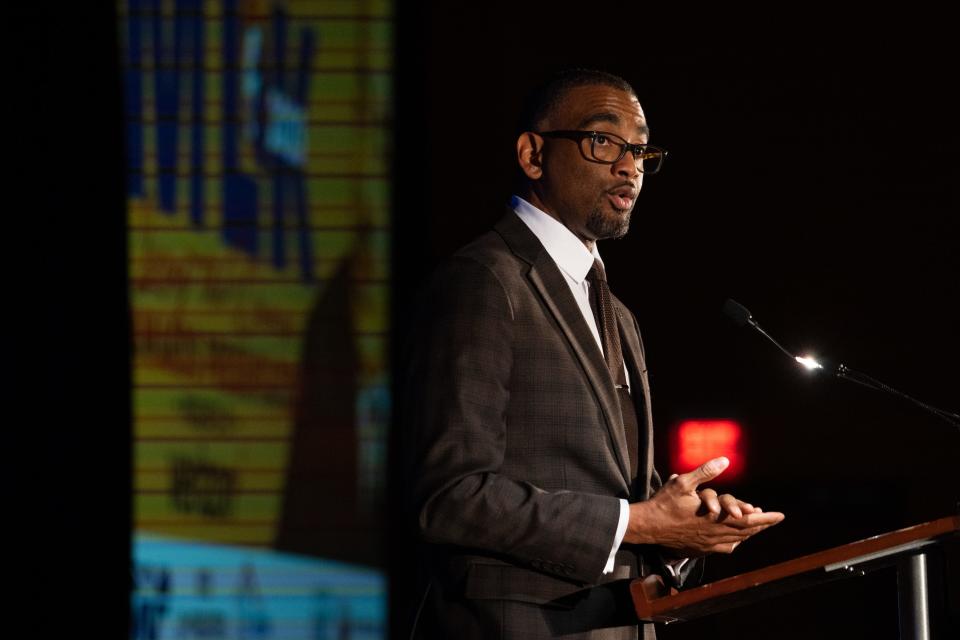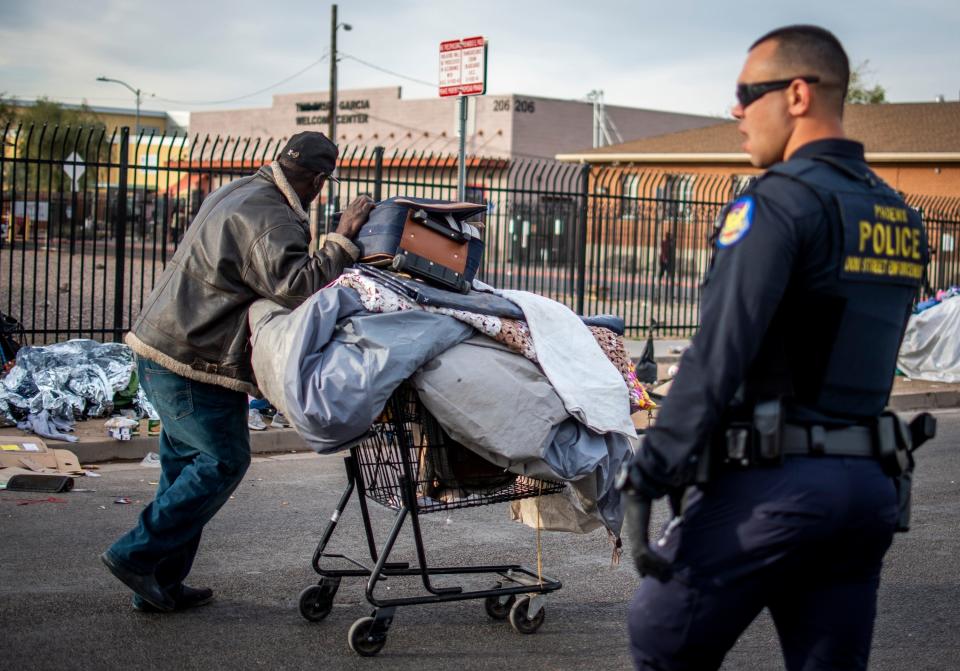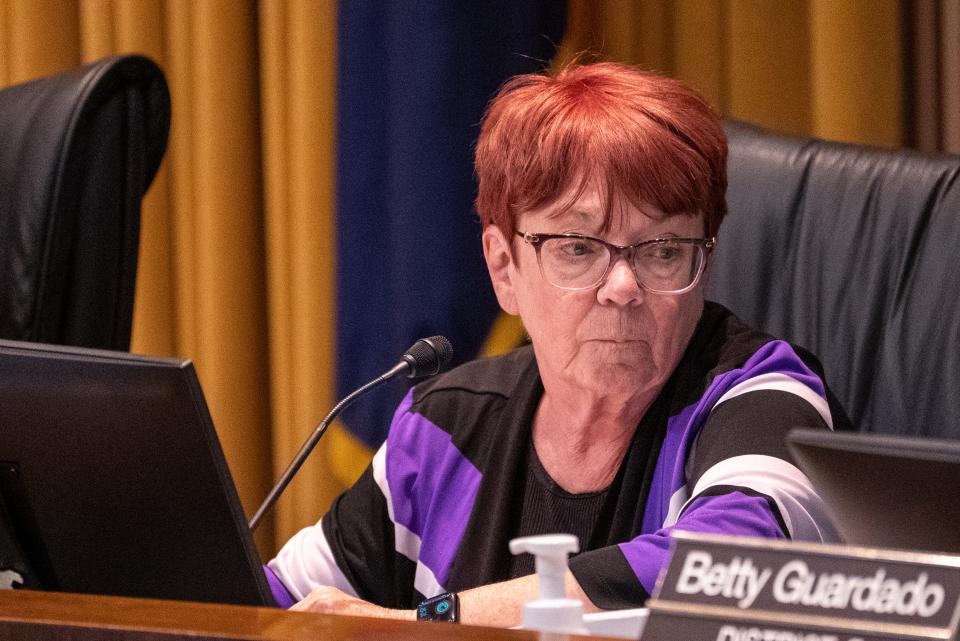Phoenix spends $15M on homelessness but may have to cut elsewhere: 'Something's gotta give'
- Oops!Something went wrong.Please try again later.
Phoenix decided to put more federal money toward homelessness over the next two years but may have to raise taxes or cut other services to sustain the programs when the funds run out.
The Phoenix City Council unanimously redirected $15 million in unused federal funds toward 11 homeless programs and projects Wednesday. The American Rescue Plan Act funds were previously directed toward programs to help refugees and asylum seekers and combat digital inequities in the city, but city officials said there were savings in contracts and program spending.
Federal guidelines mandate Phoenix must have a plan for the funds by the end of 2024 and must spend the funds by the end of 2026. Any unspent money would be taken back by the United States Treasury.
The new allocation means money will go toward helping homeless service providers operate and building new facilities, such as a cooling pavilion to reduce heat deaths or injuries in summer months. Last year was the deadliest on record in Phoenix for heat-related deaths. The official count stood at 579, with more being investigated.
Mayor Kate Gallego called the council's action an important reallocation for an urgent issue.
But most of the 11 programs, and roughly $11 million of the $15 million plan, are ongoing or operational costs.
That means the city will need to find new revenue for the programs once the federal funds run out. That could mean cutting other expenses in the city's general fund to keep the homeless programs afloat, such as the city's newly opened outdoor campground, or risk ending them, which is unlikely because it could put the city in legal jeopardy.
Phoenix is currently under court order after a judge found the city's inaction on a homeless encampment near 12th Avenue and Madison Street in downtown constituted a public nuisance. The encampment at its height grew to 1,000 individuals living on the streets. The court order came after business owners in the neighborhood sued the city, calling the encampment a "humanitarian crisis."
If conditions worsen or revert at The Zone, the plaintiffs could ask a judge to find the city in contempt. Ilan Wurman, attorney for the property owners, has already said it's under consideration.

The city is also under investigation by the United States Department of Justice, in part for the way police officers interact with people experiencing homelessness. Groups like the American Civil Liberties Union of Arizona have accused Phoenix police of improperly seizing and disposing of the belongings of unhoused people. Fewer resources for homelessness could increase the chances of negative interactions between the police and the unhoused population.
The decision to put one-time funds toward ongoing costs is meant to keep select city departments whole as officials prepare for roughly $130 million less in revenue shared from the state next fiscal year. The loss stems from the Legislature ending the rent tax and underestimating the cost of passing a flat income tax.
Phoenix's finance department defended its re-allocation plan in city documents, noting that "using ARPA funds to alleviate this pressure is a sound financial decision" because of "the anticipated budget status."
But the choice raises questions about whether the city, in its pursuit to combat homelessness and comply with legal orders, has propped up more shelters and programs than it can afford to sustain. It also prompts questions about what other city services might be on the chopping block in coming years, or if the city would seek to find new ways to raise revenue.
City Council could consider raising property taxes, though state law limits by how much. Council could also consider increasing its local sales tax, which currently sits at 2.3%. At least some council members are open to tax increases.

City Manager Jeff Barton denied any financial irresponsibility on the city's part, saying the future budgets could have handled all the new homeless programs had the state not "ripped the rug from us" by ending the rent tax and undervaluing the cost of the flat tax.
Former Republican Gov. Doug Ducey passed a flat tax in 2021. Recent analyses by the state show significant underestimations of the costs, a $234 million loss. Then in 2023, Democratic Gov. Katie Hobbs agreed to repeal the tax in exchange for GOP lawmakers' votes to put a transportation funding measure, known as Proposition 479, before voters this November.
Valley mayors railed against the repeal and have since lobbied the state to fill city coffers with some other revenue. Gallego along with Mesa Mayor John Giles and Tempe Mayor Corey Woods wrote Hobbs Jan 31.
But the state itself is projecting a likely $835 million deficit this fiscal year, which began July 1, and an estimated $879 million deficit for next year, according to numbers released in January. Barton said he thinks it's unlikely the state will come to save the day for cities.
He declined to specify what expenses could be cut if new revenue isn't found, but it may be unavoidable for Barton to avoid cutting services. He said the city would first search for administrative cuts but that city staff was already lean from the Great Recession.
Phoenix City Council will be updated on budget projections next week. Barton said a one-time surplus is expected for the upcoming fiscal year but deficits in the following two years.
"The reality is, at some point, something's gotta give. ... We don't have all the money in the world," Barton told City Council on Feb. 21. "So we will have to make tough decisions."

What the mayor and council say about future financial decisions
During the voting meeting Wednesday, council members acknowledged the tough financial decisions ahead and stressed a regional solution involving other cities, the county and the state.
Mayor Kate Gallego did not respond to questions about revenue solutions or where to make cuts but urged the state to fill its gap in a statement provided to The Arizona Republic.
“The State Legislature has cut revenue for nearly every city in Arizona, and now it’s shifting greater burdens on to cities as well. It’s unsustainable, and we’re going to have a conversation about what those impacts mean to our residents over the long term. I hope the state makes the choice to be a better partner rather than pursue ideological paths that only hurt public safety and our most vulnerable," she wrote.
Most councilmembers told The Republic they preferred administrative cuts over service cuts, if required, and were opposed to cutting homeless programs, citing the immense need.

Councilmember Debra Stark said she'd like to see other cities and the state step up to front some of the homeless program costs, alleviating pressure on Phoenix. Councilmembers Kesha Hodge Washington, Jim Waring, Laura Pastor and Betty Guardado also mentioned this.
But if cuts were necessary, Stark said she'd consider nixing the recently hired public health advisor, Nicole Dupuis-Witt.
"Because we have the county," Stark said, referring to the Maricopa County Department of Public Health.
Waring said he would deny any tax increase and suggested axing the Office of Accountability and Transparency or the Office of Heat Response and Mitigation.
Waring has long opposed OAT, the office tasked with overseeing police use of force and misconduct allegations, but ramped up his criticisms of its necessity after the state Legislature restricted its authority to solely monitoring, not investigating, police cases. Regarding the heat office, Waring said he didn't want to downplay the issue but contended the heat director, Dave Hondula, would not significantly "change the dynamic."
A fiscal conservative who frequently voices concern over excessive spending at City Hall, Waring said he believed the city could have better planned for potential cuts from the state, but said it wasn't irresponsibility. He added the city could have had at least a smaller dilemma had the council listened to his budget concerns in the past.
Hodge Washington said she would consider increasing taxes so long as they targeted tourists, not residents — she was against raising property taxes.

Councilmember Ann O'Brien, who voted to approve the reallocation plan, said she disagreed with using one-time funds for ongoing costs in principle but that Phoenix was under "extenuating circumstances" and needed to comply with legal orders.
O'Brien declined to comment on potential ways to boost revenue or cut costs, saying she needed to understand the full picture first because it would depend on the size of the shortfall.
Councilmembers Kevin Robinson, Pastor, Guardado and Ansari did not immediately respond to questions about revenue solutions or service cuts.
What the re-allocation plan pays for
The re-allocation focuses almost entirely on homelessness:
$3.84 million for temporary lodging, heat response at the Washington Street Shelter and the Central Arizona Shelter Services Haven Project.
$3 million would go toward operating the Rio Fresco shelter until June 2025.
$2 million would go toward installing outdoor LED signs at all library locations to provide information about summer heat respite and public safety.
$1.4 million for homeless services citywide. Staff said business costs increased due to inflation and after the pandemic.
$1 million to fill the budget shortfall CASS projected. This shortfall threatened to end 24-hour shelter services, pushing clients onto the street and raising concerns about a revival of the homeless encampment known as The Zone.
$912,000 to cover Phoenix's contract costs with Keys to Change, owner and operators of the Keys Campus, which houses CASS and other homeless service providers.
$700,000 for overnight heat respite programming through June 2025. More information will come at the Feb. 27 policy session.
$600,000 for temporary lodging (hotel stays) for people experiencing homelessness.
$570,000 to operate the outdoor campground through June 2025.
$500,000 to construct a "cooling pavilion" to provide heat relief to people experiencing homelessness. The location has not yet been determined, staff says.
$80,000 for administrative costs associated with monitoring compliance of how ARPA funds must be spent.
Taylor Seely covers Phoenix for The Arizona Republic / azcentral.com. Reach her at tseely@arizonarepublic.com or by phone at 480-476-6116.
This article originally appeared on Arizona Republic: Phoenix spends big on homelessness but future budgets can't afford it

